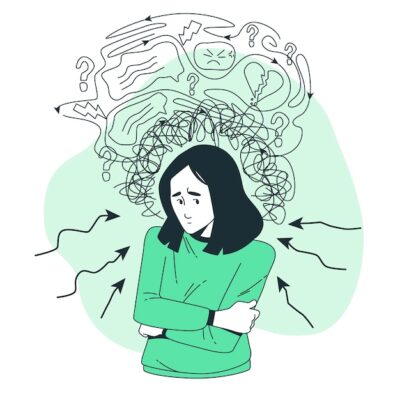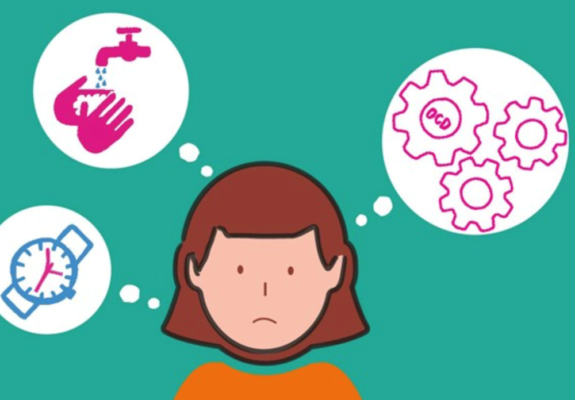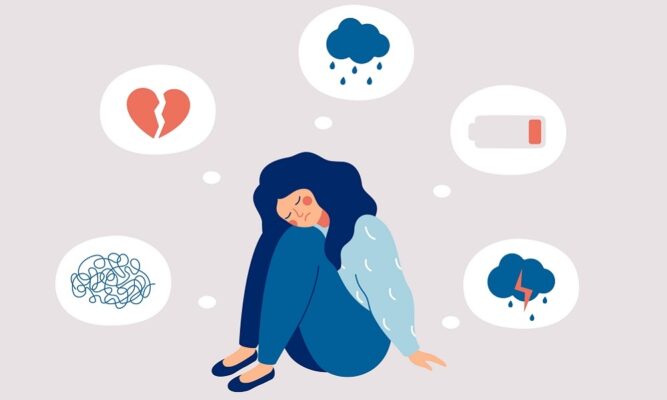- Mental health is a state of mental well-being that enables people to cope with the stresses of life, realize their abilities, learn well and work well, and contribute to their community. It is an integral component of health and well-being that underpins our individual and collective abilities to make decisions, build relationships and shape the world we live in. Mental health is a basic human right. And it is crucial to personal, community and socio-economic development.
- Mental health is more than the absence of mental disorders. It exists on a complex continuum, which is experienced differently from one person to the next, with varying degrees of difficulty and distress and potentially very different social and clinical outcomes.
- Mental health conditions include mental disorders and psychosocial disabilities as well as other mental states associated with significant distress, impairment in functioning, or risk of self-harm. People with mental health conditions are more likely to experience lower levels of mental well-being, but this is not always or necessarily the case.
- Throughout our lives, multiple individual, social and structural determinants may combine to protect or undermine our mental health and shift our position on the mental health continuum.
- Individual psychological and biological factors such as emotional skills, substance use and genetics can make people more vulnerable to mental health problems.
- Exposure to unfavourable social, economic, geopolitical and environmental circumstances – including poverty, violence, inequality and environmental deprivation – also increases people’s risk of experiencing mental health conditions.
Symptoms that show you are mentally unhealthy:
- Feeling sad all the time
- Not having the will to do anything
- Constantly fidgeting
- Zoning out
- Feeling numb and emotionless
- Pushing people away
- Feeling unworthy
- Anxiety
- Breathlessness
- Losing interest in self care
- Panic attacks
- No interest in socializing
- Self harm
- Stress eating
- Insomnia or excessive sleeping
Some causes that lead to such symptoms:
- Genetics: Depression can run in families, suggesting a genetic component to the condition.
- Chemical imbalances: An imbalance of certain chemicals in the brain, such as serotonin and dopamine, can contribute to the development of depression.
- Traumatic life events: Such as the loss of a loved one, divorce, or abuse, can trigger depression in some individuals.
- Medical conditions: Chronic illness, chronic pain, and other medical conditions can contribute to depression.
- Substance abuse: Substance abuse, particularly of drugs like alcohol and cocaine, can increase the risk of depression.
- Hormonal changes: Hormonal changes during pregnancy, postpartum, and menopause can contribute to the development of depression.
- Neurological conditions: Some neurological conditions, such as multiple sclerosis and Parkinson’s disease, can increase the risk of depression.
Depression
Depression is a mental health disorder characterized by persistent feelings of sadness, hopelessness, and loss of interest in activities that were once enjoyable.
Depression can be a debilitating condition that impacts all aspects of a person’s life, including their work, relationships, and overall quality of life. It is important to seek help from a mental health professional if you or someone you know is experiencing symptoms of depression.
It is important to seek help from a mental health professional if you or someone you know is experiencing symptoms of depression. With the right treatment and support, it is possible to manage depression and improve quality of life.
Anxiety
Anxiety is a mental health disorder characterized by feelings of fear, worry, and unease. It is a normal and natural response to stress and can help individuals cope with challenging situations. However, when anxiety becomes excessive, it can interfere with daily life and functioning.
Anxiety can manifest in many different ways, and symptoms may vary from person to person. Some common symptoms of anxiety include:
- Excessive worry or fear : Individuals with anxiety may worry excessively about a variety of things, such as work, health, relationships, or everyday activities.
- Restlessness or feeling on edge: Anxiety can cause a constant feeling of restlessness or being on edge, making it difficult to relax or unwind.
- Fatigue or irritability: Anxiety can be exhausting, and individuals may experience fatigue or irritability as a result.
- Difficulty concentrating: Anxiety can make it difficult to concentrate, focus, or remember things.
- Sleep disturbances: Anxiety can cause sleep disturbances, such as difficulty falling or staying asleep, or waking up feeling unrested.
Panic Attacks
A panic attack is a sudden and intense episode of fear or discomfort that can last for several minutes or up to an hour. It is a type of anxiety disorder that can be debilitating and disruptive to daily life.
Some common symptoms of a panic attack include:
- Rapid heartbeat or palpitations
- Shortness of breath or hyperventilation
- Sweating or chills
- Nausea or stomach discomfort
- Dizziness or lightheadedness
- Trembling or shaking
- Fear of losing control or going crazy
- Fear of dying
Panic attacks can be triggered by a variety of factors, including stress, life changes, trauma, and certain medical conditions. They can also occur unexpectedly, without an apparent trigger.
How to seek help
Therapy
Therapy is a form of treatment that aims to help individuals improve their mental health and well-being. It involves talking with a mental health professional, such as a psychologist, counselor, or therapist, in a safe and confidential environment.
Therapy can be beneficial for individuals experiencing a wide range of mental health concerns, including depression, anxiety, trauma, relationship issues, and addiction. It can also be helpful for individuals who are seeking personal growth and self-improvement.
There are many different types of therapy, and the type of therapy that is most effective will depend on the individual’s specific needs and concerns. Some common types of therapy:
- Cognitive-behavioral therapy (CBT): CBT is a form of therapy that focuses on identifying and changing negative thought patterns and behaviors that contribute to mental health concerns.
- Dialectical behavior therapy (DBT): DBT is a form of therapy that combines CBT techniques with mindfulness and acceptance-based strategies.
- Psychodynamic therapy: Psychodynamic therapy is a form of therapy that focuses on exploring unconscious thoughts and feelings and how they impact behavior.
- Family therapy: Family therapy is a form of therapy that involves working with families to improve communication and resolve conflicts.
- Group therapy: Group therapy is a form of therapy that involves working with a group of individuals who are experiencing similar concerns.
Therapy can be conducted in-person or online, and the length of treatment will depend on the individual’s specific needs and concerns. It is important to work with a mental health professional to determine the best type of therapy and treatment plan for your individual needs.
Online Therapy: Rocket Health, Amah
INNER ENGINEERING:
Inner Engineering is a lifestyle practice founded by Sadh guru Jaggy Vasudev that incorporates practices of yoga, meditation and a spiritual guide that deepens your life experience and understanding of how to live a more fulfilling life.
Inner Engineering is a technology for well-being derived from the science of Yoga. It is offered as a comprehensive course for personal growth that brings about a shift in the way you perceive and experience your life, your work, and the world that you live in.
The objective of the program is to render you to explore your highest potential through powerful processes of self transformation, distilled essence of classical yoga, meditations to address key aspects of life and access to secrets of ancient wisdom.
Inner Engineering offers a unique opportunity for self-exploration and transformation, leading to a life of fulfillment and joy.
Inner Engineering is a tool for well being
It’s a method, a tool to engineer a deep lasting personal transformation. Over 7 million people have completed Inner Engineering and reported remarkable results. Inner Engineering gives you simple tools to eliminate stress, relieve chronic diseases, sleep better, increase energy and productivity, maintain emotional balance, improve relationships and communication and experience your life each moment to the fullest.
Reported statistics of people who tried inner engineering:

Website: Inner Engineering




